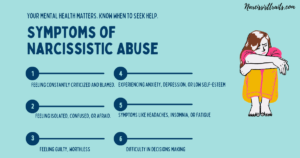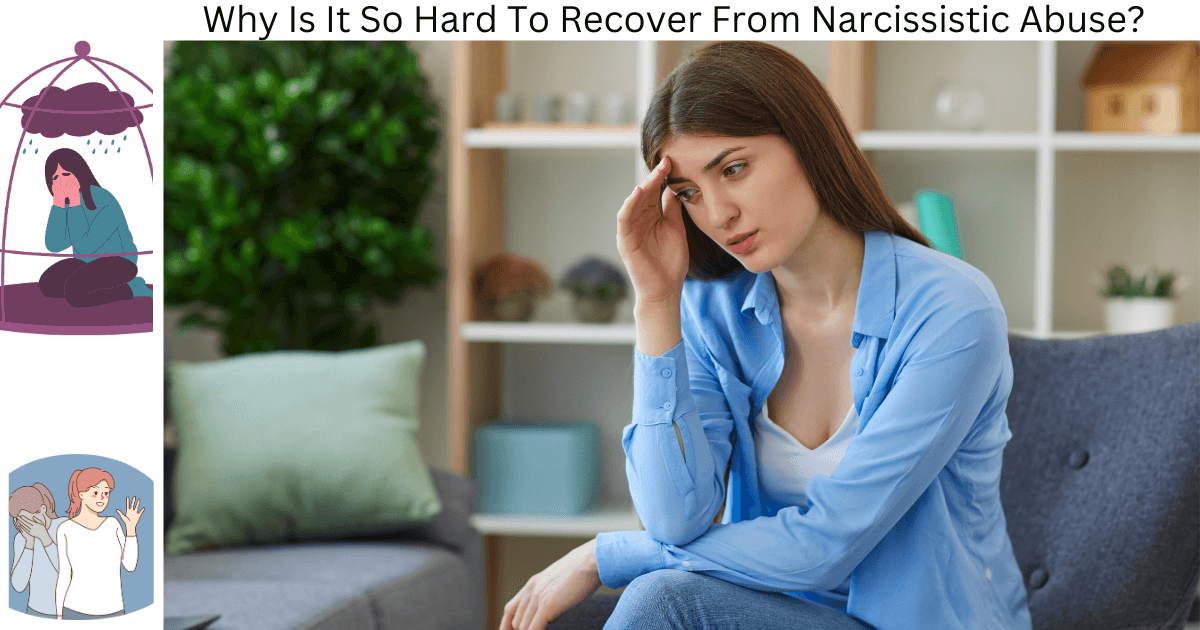Why is it so hard to recover from narcissist abuse? To answer this question, we first need to identify what narcissist abuse is and what narcissist abuse looks like. Narcissism is a psychological disorder that shows different behavioral patterns, and they tend to control the person.
A narcissist is an individual with an exaggerated sense of self-importance, a craving for admiration, and a notable absence of empathy toward others. Narcissists often use manipulation, control, and intimidation to exploit and harm their victims.
To learn more about Narcissism, Visit what-is-narcissism. I know you might be thinkinking many things and many questions will be arising in your mind over time like Will i ever recover from narcissistic abuse, Is there a moment when narcissistic abuse gets worse? Why can’t I get over narcissistic abuse? But you don,t need to worry about anything because these things are normal first you need to understand all the traits narcissists using on you.
6 common signs of narcissistic abuse are:

Points:
- Feeling constantly criticized and blamed.
- Feeling isolated, confused, or afraid.
- Feeling guilty, worthless, or responsible for the narcissist’s problems.
- Having difficulty making decisions or trusting your own judgment.
- Experiencing anxiety, depression, or low self-esteem by some person.
- Having physical symptoms such as headaches, insomnia, or fatigue.
The symptoms may vary from person to person, but these are some of the most common features of narcissist abuse.
Note: Narcissistic abuse is not limited to romantic relationships only. It can happen with parents, siblings, coworkers, friends.
Effects of narcissist abuse.
Narcissist abuse not only causes psychological impacts but also affects a person’s health and emotions. Some of the grave effects of narcissism are as follows.
-
Damage your brain:

Narcissistic abuse can damage your brain. It can cause changes in your brain structure and function, such as shrinking your hippocampus (the part that regulates memory and emotions), enlarging your amygdala (the part that triggers fear and anxiety), and reducing your prefrontal cortex (the part that controls rational thinking and decision making). These changes can make you more prone to stress, depression, PTSD, and cognitive impairment.
-
Break your spirit:
Narcissistic abuse can break your spirit. It can make you feel worthless, hopeless, and powerless. Narcissists often use tactics such as gaslighting, projection, blame-shifting, and invalidation to make you doubt your reality, your feelings, and your sanity. They also use intermittent reinforcement, love bombing, and devaluation to make you addicted to their approval, attention, and affection. They can make you lose your self-confidence and autonomy.
-
Isolate yourself from others:

Narcissist manipulation can isolate you from others. It can make you feel lonely, misunderstood, and unsupported. Narcissists often try to cut you off from your friends, family, and other sources of social support. They may accuse you of being disloyal, ungrateful, or selfish if you try to maintain your relationships with others.
They may also smear your reputation, spread lies, sabotage your opportunities to make you look bad, or ruin your chances of success. They can make you feel like you have no one to trust or turn to
Understanding in Detail Why is it so hard to recover from narcissist abuse?
Recovery from such psychological abuse is not very easy. The person feels emotionally and psychologically shattered, which makes the recovery process more difficult. The following points highlight several reasons why it is challenging to recover from such abuses. Why is it so hard to recover from narcissist abuse?
-
The state of affairs has become increasingly intricate.
Something that seemed to be about two people turned out to be all about one person alone: the narcissist. The moment this fact sinks in, you might revisit the things you thought were going on between you two and what were.
- You feel like a fool.
Damaged self-criticism is a common trap for victims of narcissistic abuse. Their emotional recovery is impeded because they feel like a fool for believing the things that the narcissist said or did. They think something is wrong with them because they failed to see the person for who they were.
- The misery.
Why is it so hard to recover from narcissist abuse? One more reason why healing from narcissistic abuse can take too long is because the things that any intelligent person wouldn’t miss suddenly pop out. Everything the victim missed in the past or stayed hidden from sight is now in plain view. Recognizing the problem only when everything is already said and done makes recovery challenging.
- You Feel Lost
Narcissists self-regulate by feeling in control and powerful, and they can only do this if there is someone they can push around. Once you think defensively without the ability to be reactive, you might find it hard to be in control and emotionally balanced. It’s like you are just functioning on autopilot without recovering from the experience.
- Psychological Traumas

You hate your life, and everything that used to make you happy makes you sad. Material things no longer make you happy since you don’t want to live normally. You want to isolate yourself from the world and then think of ending your life, that dreadful conclusion you come to eventually. Though you are still alive physically, you have already passed away mentally.
- You can’t trust others again easily
Narcissist abuse changes your trust and beliefs in others. People can recover from bankruptcy or material worldly failure if they heal and return to life. The vital word is to get back on life, but narcissistic abuse makes you question your living existence and, what is worth of your life, why all these things always happen to you.
It’s challenging to recover, and when you do that, you have lost your original self; you are not even a quarter of your actual personality. You won’t ever trust others Doubtful. It’s complicated to recover, and when you do that, you have lost your original self; you are not even a quarter of your actual personality. You won’t ever trust others Doubtful. Why is it so hard to recover from narcissist abuse?
How can you recover from narcissist abuse?

Why is it so hard to recover from narcissist abuse?
The above reasons briefly explain why it is so difficult to recover from narcissist abuse. We will observe some key points to help you recover from such violations. The following are some Emotional healing strategies that will help in your Psychological recovery phase.
Cut off contact with narcissist abuser:
Narcissists will try to lure you back in with false promises, guilt trips, or threats, so you need to set firm boundaries and protect yourself from their manipulation. You may need to block their phone number, email, social media, or any other means of communication.
You may also need to get a restraining order or legal assistance if they harass or stalk you. Why is it so hard to recover from narcissist abuse?
Surround yourself with supportive people:
You need to rebuild your social network and find people who can offer you emotional support, empathy, and understanding to Heal from emotional abuse.
These can be your friends, family, co-workers, or anyone who cares about you and respects you. You can also join a support group, an online community of survivors who can relate to your situation and offer advice and encouragement.
Observe self-care:
Coping with narcissist trauma can affect your physical and mental well-being, so you need to take care of yourself and your needs. It can involve getting enough sleep, eating healthy, exercising, meditating, relaxing, or doing anything that makes you happy and calm.
You must also be kind and compassionate to yourself and avoid self-blame, self-criticism, or self-punishment. You are not responsible for the abuse or the abuser’s behavior. Love and respect are due to you.
Identify yourself:
To identify yourself, you need to overcome abuse trauma. Narcissistic abuse can make you lose your sense of identity and self-worth, so you need to reconnect with yourself and your passions. You can explore your interests, hobbies, talents, goals, or dreams.
You can also try new things, learn new skills, travel, or participate in social work. You can also write to express your feelings and thoughts so that you can overcome abuse trauma. Remember that you are a unique and valuable person with much to offer to the world. Keeping you busy while recovering also helps speed up the pace of recovery.
Consider this as God’s curse for evil deeds you have done in a previous life: repent, feel remorse, and then carry on with life.
You will barely live like an old car, but the truth is no one cares if you exist on earth. So better, except you have failed in love, and you would heal slowly with time, not entirely, but you will cross the line someday and find peace.
Take your time to heal:
Why is it so hard to recover from narcissist abuse, recovery from narcissistic abuse is not an easy process. You may experience ups and downs, setbacks, anger and sadness, hope and despair. You may also have flashbacks, nightmares, triggers, or doubts. These are a normal part of the healing journey.
However, you will recover from that abuse sooner or later, but don’t compare yourself to others or pressure yourself to heal faster. Take it one day at a time and celebrate your progress, no matter how small. You will overcome this because you underestimate your strength.
Seek professional help: Why is it so hard to recover from narcissist abuse?
A therapist or consultant can help you process your trauma, validate your feelings, provide you with coping skills and strategies, and channel you into the proper path.
They can also help you identify and heal from any underlying issues that may have made you vulnerable to narcissistic abuse. Feel free to contact us for more info and future guidance.
Lets Recap: Why is it so hard to recover from narcissist abuse
Psychological manipulation and exploitation of an individual by a person warped in a sense of self-importance, a need for praise, and a lack of empathy for others is known as narcissistic abuse. Any relationship, even with parents, siblings, coworkers, and colleagues, can experience it. The victim of narcissistic abuse may experience harm to their mind, soul, and social ties.
It can escort structural and functional alterations in the brain. While it’s not simple, recovery from narcissistic abuse is achievable. It entails severing ties with the abuser, surrounding oneself with caring individuals, practicing self-care, coming to terms with oneself, giving oneself space, healing gradually, and getting professional assistance. Why is it so hard to recover from narcissist abuse.
Victims must reestablish contact with their sense of self, identity, autonomy, sanity, and reality. They must also refrain from self-punishment, self-criticism, and self-blame and instead practice kindness and compassion for themselves.

